Contributing € 10
Thank-you on the website
Your name will appear in the thank-you-section or the website of colectivo zompopo
> 30 Backers
We use own and third party cookies to improve your user experience and our services, analyzing users' browsing in our website. If you continue browsing, we will consider that you consent to its use. You can get further information in our Cookies Policy
Fogones Mejorados de Adobe en Nicaragua
 Min.
Min.
 Opt.
Opt.
Your name will appear in the thank-you-section or the website of colectivo zompopo
We will choose a photo of an improved adobe stove recently realized and dedicate it to your name + acknowledgement on the website.
We will choose a photo of an improved adobe stove recently realized and dedicate it to your name and send it to you + personalized digital photo + acknowledgement on the websit
A mini-adobe with your name or a phrase you send us engraved + personalized printed photo + personalized digital photo + acknowledgment on the website
We invite you to meet with us in person (or through videoconference, depending on your location) to share the experience of the project + dedicated adobe paperweights + personalized printed photo + personalized digital photo + acknowledgement on the website.
Calendar with your own selection of twelve photos of the improved stoves you like most + invitation to the conference + dedicated adobe paperweights + personalized printed photo + personalized digital photo + acknowledgement on the website.
Your name and logo will appear on our website and in the manuals as an official patron of the project. You will also be mentioned in the press releases during the diffusion campaign + personalized calendar of the stoves + invitation to the conference + dedicated adobe paperweights + personalized printed photo + personalized digital photo + acknowledgement on the website.
Mujeres constructoras de familias más sanas y comunidades más sostenibles.
 Task
Task
|
Minimum | Optimum |
|---|---|---|
|
1ST STAGE: DIAGNOSIS OF THE COMMUNITY’S LIVING SITUATION
Design, execution, and reports of two workshops:
“Workshop 1: What do you dream of for your community, house, family?” and
“Workshop 2: Getting to know the problems of the families affected by open fire: health, environment, gender...”
|
€ 540 | |
|
STAGE 2: PARTICIPATORY DESIGN OF THE IMPROVED STOVE
Design, execution, reports, and expenses of three workshops. Includes the final design of the stove.
“Workshop 4: Empiric verification of the basic principles for designing an improved stove” and
“Workshops 6 and 7: Participatory design of the stove”
|
€ 1.791 | |
|
STAGE 3: CONSTRUCTION WORKSHOPS
Design, execution, and reports of four workshops: “Workshop 9: Production of the bricks for the model stove” and “Workshop 10, 11, and 12: Construction of the model stove” (Construction will take place in smaller groups, so the workshops will be repeated four times).
|
€ 1.940 | |
|
STAGE 4: SELF-CONSTRUCTION OF THE FAMILIES’ STOVES
Individual technical monitoring of each family’s construction process.
|
€ 970 | |
|
SELF-CONSTRUCTION MANUAL
Development of a manual for the self-construction of an improved stove. The open-source manual is also one of our collective compensations.
|
€ 840 | |
|
METHODOLOGICAL REPORT
Development of a methodological open-source report that describes the operative strategies and the content of every workshop. Hoping that the report may help other initiatives, this documentation is one of our collective compensations.
|
€ 373 | |
|
MANAGEMENT AND MONITORING OF THE PROJECT
Administration of the minimum budget by the local organization La Cuculmeca.
|
€ 450 | |
|
TECHNICAL FACILITATION
Specialist of La Cuculmeca who will supervise the project throughout the seven months of work.
|
€ 917 | |
|
CONSTRUCTION OF MODEL STOVE
After the participatory design, a stove prototype will be constructed in order to analyze its functionality and energy efficiency. It will be tested by the project’s participants, who will cook with it to verify the characteristics of the design and aspects like cooking time and ergonomics.
|
€ 149 | |
|
(+STAGE 1)
Design, execution, reports, and expenses of “Workshop 3: Analysis of the family health repercussions”. Also includes the transport of the technicians to the site and the material needed for the workshop.
|
€ 401 | |
|
(+STAGE 2)
Design, execution, reports, and expenses of two workshops. “Workshop 5: Local construction material alternatives” and “Workshop 8: Learning the basic techniques of the designed stove”. Also includes the transport of the technical supervisors to the site and the material needed for the workshop.
|
€ 877 | |
|
SITE VISITATION
Trip to the community of La Prusia, where the women can share their experiences cooking with the improved stoves together with other families who participated in a similar process.
|
€ 860 | |
|
MONITORING OF THE STOVES
Post-construction site visitations to check the functionality and usage of the families’ stoves.
|
€ 560 | |
|
MANAGEMENT AND MONITORING OF THE PROJECT
Administration of the optimal budget by the local organization La Cuculmeca.
|
€ 190 |
 Material
Material
|
Minimum | Optimum |
|---|---|---|
|
STATIONERY
Material needed for the preparation, execution, and report of the theoretical-practical workshops.
|
€ 143 | |
|
ASSISTING TOOLS FOR CONSTRUCTION
Material needed for the practical workshops and the self-construction stage. Upon conclusion of the project, these tools will stay with the community to facilitate future construction of stoves.
|
€ 424 | |
|
CONSTRUCTION MATERIALS FOR THE STOVES
Necessary for the construction of 30 improved stoves (including transport). Each stove costs 48.50€, part of which will be paid by the members of the community. With this money, a revolving fund for future community projects will be created.
|
€ 1.455 | |
|
INDIVIDUAL REWARDS
Printing and mail of individual rewards of the project.
|
€ 100 | |
|
TEAM FOR TECHNICAL EVALUATION
Rent of material needed for the technical evaluation of the stove prototype. Includes a particle meter for the analysis of gas emissions in order to determine the stove’s energy efficiency.
|
€ 373 | |
|
PRINTING OF THE SELF-CONSTRUCTION MANUAL
Printing of 45 copies for the community members and the local NGO.
|
€ 100 |
 Infrastructure
Infrastructure
|
Minimum | Optimum |
|---|---|---|
|
TRANSPORT
Transport of the technical supervisors to the communities for the carrying out of the workshops and field work.
|
€ 313 | |
|
BANKING AND PAPERWORK EXPENSES
10% of the total minimum budget donated through the crowdfunding platform and banking transactions.
|
€ 1.025 | |
|
BANKING AND PAPERWORK EXPENSES (optimal)
10% of the total optimal budget donated through the crowdfunding platform and banking transactions.
|
€ 351 | |
| Total | € 11.281 | € 15.142 |
Participative design and self-construction of 30 firewood efficient and sanitary kitchens with local materials.
“Improved adobe fireplaces and stoves” responds to the sanitary and environmental problems caused by the traditional kitchen and open fires. Its primary objective is to holistically improve the home life conditions to be healthier, reduce deforestation and diseases caused by smoke. It is also presented as a means for empowering communities and enhancing the role of women. It is a minimal architectural intervention, with extensive social effects.
This process was outlined with the participation of the local communities as the main actors of their own development. Through participative design workshops the project hoped to adapt a technology within the context of the local culture, responding not only to their needs but also to their aspirations. The self-construction with the use of soil (adobe), triggers the use of their own human as well as material resources, reinforcing a constructive culture which is hoped to generate capacities which can be continued and reproduced. Additionally, these working dynamics reinforce collective self-esteem, contributing to an egalitarian participation process and promoting values of solidarity and teamwork.
The project is inspired by popular wisdom y increases the cultural capital to ensure the continued use and maintenance of the stoves. Based on generating knowledge which may be reproduced which doesn’t only allow the local population to appropriate and spread the technology, but also assuming a return to the collective in order to address this problem on a global scale.
They are not only 30 stoves, but the path in itself opens new opportunities…
“Improved adobe fireplaces and stoves” is carried out through 12 workshops, conceived as spaces of exchange where collective skills are strengthened. Locally obtainable materials will serve as the basis for construction and the community’s knowledge will be the cornerstone of the project. The process is divided into four stages:
1-Diagnosis of the group’s living situation
Taking the collective dream of improving kitchen practices, a critical discourse surrounding the topics of health, the environment, and gender will be encouraged, generating real-life impact and creating change.
2-Participatory design of the improved stove
The process will allow the technology to be adapted to the cultural context, integrating the experiences and aspirations of the participants. There is no predetermined design. Rather, some expertise will be introduced in order to respond to specific necessities that may arise. The stove will be adapted to the local culinary customs while reaching high levels of energy efficiency, reducing the consumption of firewood by at least 50% and carbon emissions by more than 80%. This stage includes a prototype for the stove, from which the efficiency can be measured, as well as a trip to another community to exchange experiences. On both occasions, the women will be allowed to cook and evaluate specific aspects of the stove.
3-Construction Workshop
The members of the community, the majority of whom live in adobe houses, will learn new construction techniques with adobe and, in small groups, experiment with the construction of a model stove. This stage aims at establishing a learning community, not only for the construction of the families’ stoves but also for other possible occasions in the future.
4-Self-construcion of the families’ stoves
The families will construct their stoves with the help of individual technical monitoring, which will continue the passing-on of knowledge and assure the durability of the stoves. To further strengthen construction expertise, a manual that graphically explains the construction steps may be developed.
Upon the conclusion of this process, the community will realize a monitoring process to assure durability and correct usage. We do not define the project’s success by the number of constructed stoves, but by the number of those that stay in use.
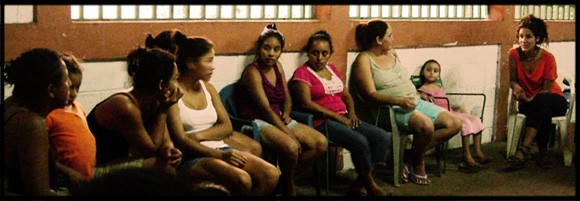
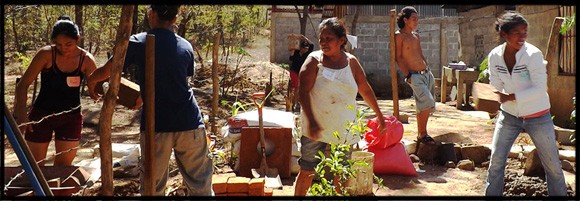
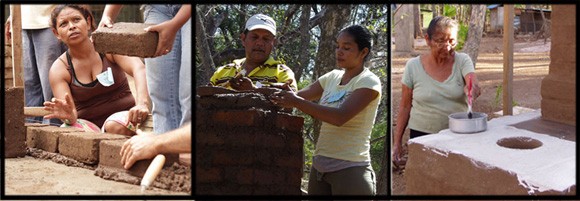
In Nicaragua, like in many countries of the world, kitchens with open fires have grave sanitary and environmental repercussions. In light of rising prices for gas and easy access to woodland, firewood continues to be used especially in areas of grave poverty. This is a massive problem; to the extent that in central America alone, more than 20 million people use firewood for cooking. Therefore, it is important to find forms of using biomass from wood more efficiently and sustainably.
The “biomass improved stoves” improve the benefits derived from firewood, by reducing CO2 emissions and diminishing the inhalation of smoke. Since the 1970s, practices of cleaner kitchens have been promoted in the development sector, but in many cases, the primary concern was energy efficiency, while cultural aspects were ignored, often causing the new technologies to be rejected by local populations.
“Improved adobe stoves” responds to a double challenge. On the one hand, it has to find a middle ground between energy efficiency and the local food culture. On the other hand, the response should address the problem in a broad manner. The challenge is planted at the bottom, with users being the principal actors in the process, enabling the generation of a shared and reproduced knowledge.
The project is developing in the “Corredor Seco” of Jinotega, a territory acutely threatened by climate change, and especially affected by problems of deforestation. The rural communities of Walasa, Agua Zarca, Paso Anchoand and Los Calpules are very isolated populations, which have practically no formal social coverage. Conditions of life are marked by extreme poverty mostly due to the limited access to alternative forms of development.
The project directly involved approximately 150 to 180 beneficiaries. Although, it is mostly directed at women since they are principally the ones involved with cooking. In these communities it is generally men who decide about changes in the home, diminishing the priorities of women to the “back yard”. In this context, the project attempts to involve the entire family in the process, strengthening the role of women in inter familial relations.
The objectives of the project are specific to the local population, but its reach may be much broader and may have multiplying effects in time and space. In addition to constructing 30 improved adobe stoves, the project expects to generate technical knowledge and promote practices, which the community may transmit to future generations.
The documentation produced will help to spread knowledge in the network, creating a collective return that may inspire similar projects in other contexts, necessary to address the problem on a global scale.
Short-Term Objectives:
Long-Term Objectives:
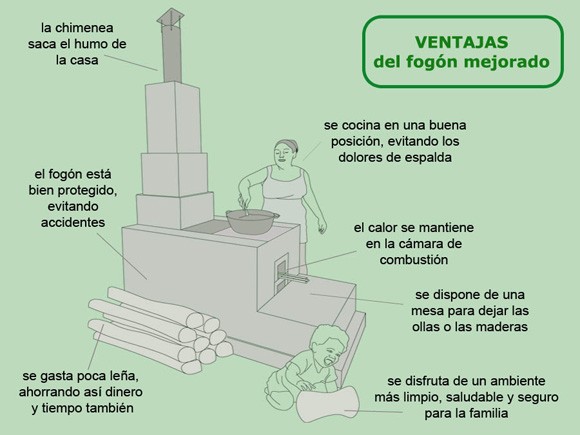
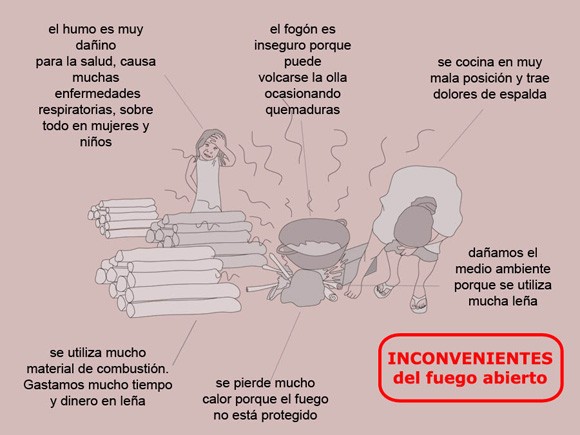
The working team consists of three pillars. The local organization “La Cuculmeca” will allow the establishment of the project in communities which it has been working with since 2008. Colectivo Zompopo will contribute specific knowledge obtained through previous experience in participatory design and self-construction of improved stoves with local materials. The communities will actively participate in the project, contributing their own knowledge and resources. They are not only people with necessites, but also with skills and capacities.
Colectivo zompopo has developed a pilot project of 15 improved adobe stoves in the community of La Prusia, Granada, Nicaragua. This precedent allows the guidance of the present project, including the operative strategies and the successful activities that have resulted from the first project. The
“La Prusia” model is a reference both on technical and design level. It is a base that will be enrichened and perfected by the contributions generating during the new process. The previously developed participatory methodology will be re-contemplated with the ample experience of the local NGO.
The association of education and communication “La Cuculmeca” is an education and communication association that facilitates and impacts sustainable management of the environment and participation of communities in their own development. It is composed of a general assembly of associations, a board of directors, collegiate management for the management of strategic development and the management of administering strategic capacities. Currently, it executes 26 development projects in 160 communities of 7 municipalities in the department of Jinotega. Between them, they are developing the project of “Promotion of Rural Agriculture”, contributing to the nutritional security of the families through several efforts that promote ecological production, environmental protection, and civil participation. The new project compliments this effort to improve the conditions of rural life.
The members of the communities of Walasá, Agua Zarca, Paso Ancho, and Los Calpules are experts on local materials and their applications in construction. Due to isolation and a precarious economic situation, the majority of the houses are built with mud, using adobe or “taquetzal” techniques. This building culture, greatly forgotten by the rest of the country, will constitute an important contribution to the construction and design process. In addition, the families will actively participate in all phases of the project.
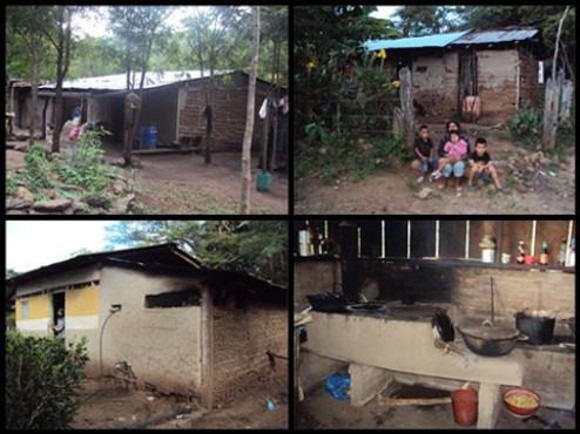



Thank-you on the website
Your name will appear in the thank-you-section or the website of colectivo zompopo
> 30 Backers
Personalized digital photo of an improved adobe stove
We will choose a photo of an improved adobe stove recently realized and dedicate it to your name + acknowledgement on the website.
> 11 Backers
Personalized printed photo of an improved adobe stove
We will choose a photo of an improved adobe stove recently realized and dedicate it to your name and send it to you + personalized digital photo + acknowledgement on the websit
> 15 Backers
Dedicated adobe paperweights
A mini-adobe with your name or a phrase you send us engraved + personalized printed photo + personalized digital photo + acknowledgment on the website
> 22 Backers
Invitation to the Journey “Sharing the experience of the improved adobe stoves”
We invite you to meet with us in person (or through videoconference, depending on your location) to share the experience of the project + dedicated adobe paperweights + personalized printed photo + personalized digital photo + acknowledgement on the website.
> 05 Backers
Personalized calendar of the stoves
Calendar with your own selection of twelve photos of the improved stoves you like most + invitation to the conference + dedicated adobe paperweights + personalized printed photo + personalized digital photo + acknowledgement on the website.
> 08 Backers
Patron of the project
Your name and logo will appear on our website and in the manuals as an official patron of the project. You will also be mentioned in the press releases during the diffusion campaign + personalized calendar of the stoves + invitation to the conference + dedicated adobe paperweights + personalized printed photo + personalized digital photo + acknowledgement on the website.
> 04 Backers
Spread the word! We need to reach a lot of people in order to finance the project, so we encourage you to spread our initiative as much as you can. Vi
The technical assessment of the stove prototype described in the budget requires technical material very hard to find in Nicaragua, which substantiall
The project is open to new collaborators who can contribute technical assistance and new ideas. Other similar experiences can be a great help!
The documents created during the process will have a better reach if they exist in various languages. We would like for our collective compensations �